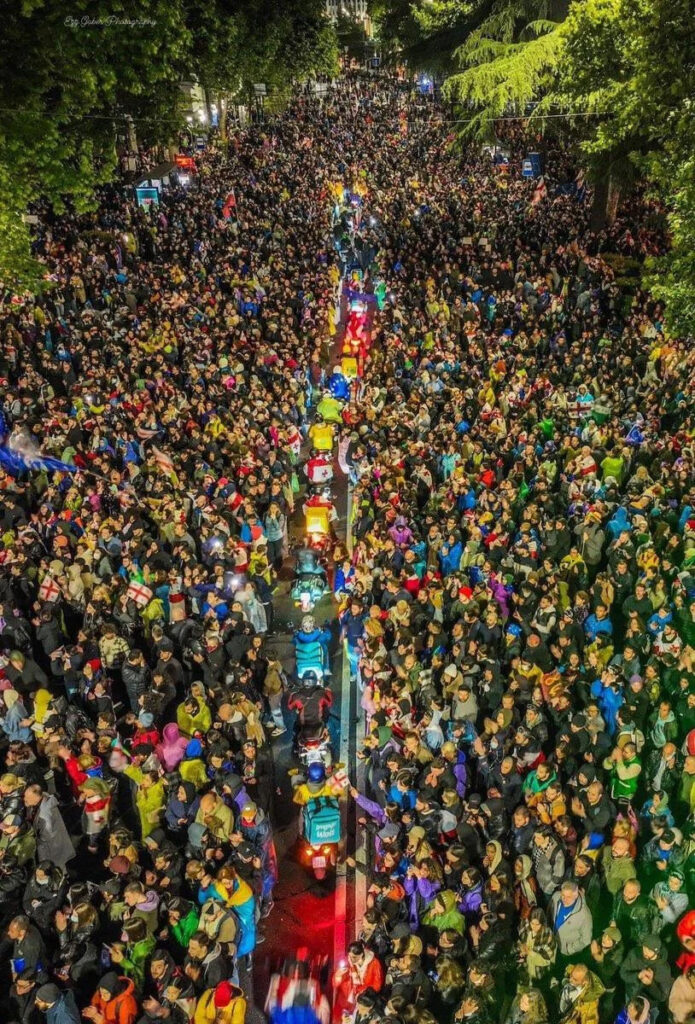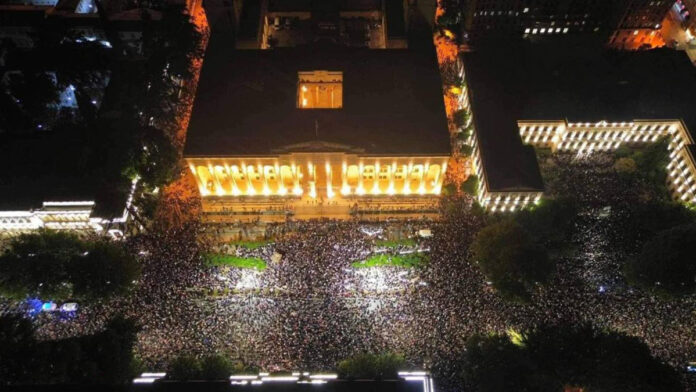Dimitris Mitrakas
In Georgia, there have been mass protests almost daily for more than a month now. The protests mainly take place in Tbilisi, the capital city, but there are also protests in other cities such as Batumi, Kutaisi, and Telavi. The trigger for these protests was the ruling party Georgian Dream (GD) proposing the “Foreign Agent” bill. They attempted to pass this bill last year but withdrew it due to massive protests. In February, Georgian Dream appointed a new prime minister, Irakli Kobakhidze, and two months later, they reintroduced the bill.
“Foreign Agents” bill
The bill requires non-governmental organizations (NGOs) and media outlets with more than 20% of their funding coming from outside Georgia to register as bodies “pursuing the interests of a foreign power.” If they refuse to do so and disclose information about foreign funding, they will face a fine of 25,000 lari (8,477€), followed by additional fines of 20,000 lari (6,781€) for each month of non-compliance thereafter. Georgia’s government claims the bill is needed to promote transparency, combat “pseudo-liberal values” promoted by “foreigners,” and preserve the country’s sovereignty. However, the Georgian government already has full visibility of NGO and media outlet funding: all grant agreements are uploaded onto a government website, and the Ministry of Finance has access to their financial records for audit purposes.
At the same time, it should be noted here that obviously, NGO’s are used by the West to influence Georgian politics and push for their agenda in various fields.
There were three readings in Parliament in which the foreign agent law was voted on, the last one taking place on May 14 with tens of thousands of people protesting outside. That session lasted only 2 minutes. President Salome Zurabishvili vetoed the Foreign Agents Law on May 18, but the ruling party overrided the veto on May 28, as only a simple majority was enough.
International repercussions
The foreign agent law has impacted Georgia’s international relationships. Many Georgians harbor significant resentment against Russian imperialism due to the Tsarist past, problematic Soviet policies under Stalin, the 1991–1992 South Ossetia War, and the 2008 Russo-Georgian War, which led to the de facto separation of Abkhazia and South Ossetia regions. Consequently, most people see a Euro-Atlantic and NATO alliance as the only way to guard against Russian aggression. As a result, 82% of Georgians want to be part of the European Union. Georgia applied for EU membership in 2022 and was granted candidate status in December of the same year. However, EU spokesman Peter Stano has warned that if this law is adopted, it will be a serious obstacle for Georgia’s European aspirations. Additionally, in a mafia-type manner, EU Commissioner Oliver Varhelyi reminded Prime Minister Irakli Kobakhidze of the assassination attempt on Slovakia’s leader during a phone call, warning him to “be very careful.”
In the US Senate, a bill was introduced on May 23 entitled “To Support Democracy and the Rule of Law in Georgia, and for Other Purposes,” or the “Georgian People’s Act” (GPA). This bill includes sanctions on Georgian officials, a review of foreign assistance, and a reassessment of existing bilateral relations. The US sees these measures as a way to force the Georgian government back on Western track.
Georgian Dream presents itself as a pro-Western party. In reality, they seem to be trying to implement a more balanced policy between the West and Russia. After the war in Ukraine broke out, they refused to sanction Russia and even refused European countries the use of their airports. They also criticize the United National Movement (UNM), the main opposition party, for being so pro-Western that they allegedly caused the 2008 Russo-Georgian War. Their goal appears to be to benefit as much as they can from both sides of the geopolitical divide.
In any case, EU membership is neither a realistic “dream” that can come true nor necessarily a good one. Throughout the long history of the European Union, EU policies have favored strong economies to the disadvantage of weaker ones, like Georgia. The economic “freedom” offered by the EU allows big multinational companies to enter new countries, exploit cheap labor, buy state assets through privatizations, and capture a significant share of the local market for their products and services. The profits extracted through this policy are transferred outside the borders. Additionally, the “financial support” provided by the EU, which is essentially a small compensation for the huge profits they make, comes with many restrictions, rules, and guidelines that result in more worker exploitation.
The EU granted Georgia candidate status after many years of back and forth. Even now, they require Georgia to fulfill a vague set of 12 rules. Their threat that the “foreign agents” law will hinder membership is based on the law not following “EU norms and values”, but there is no specific EU law or rule that prohibits regulation of NGO funding. On the other hand, the set of 12 rules does not address the diminishing LGBTQ+ rights under Georgian Dream in recent years. In reality, under the current circumstances, the prospect of EU membership for Georgia is a pipe dream, as it would provoke an aggressive response from Russia, similar to what happened in Ukraine.
Ivanishvili and his agenda
Bidzina Ivanishvili founded Georgian Dream in 2012, won the elections the same year, and left all political positions in 2013. However, many people consider him the hidden ruler of Georgia. He made his fortune in Russia and is the richest man in Georgia, ranking 624 on the Forbes list. He specifically assumed responsibility for the “foreign agents law” and the legislation targeting the queer community.
In the past, Ivanishvili has used political manipulation, violence, intimidation, propaganda, disinformation, and corruption to control the political scene. A key example is when the EU asked Georgia to address 12 EU-designated priorities and enact reforms, one of which was the “de-oligarchization” of Georgian politics. As soon as that happened, Ivanishvili declared he was returning to politics. There are also reports accusing Ivanishvili of funding opposition parties and politicians.

“Offshore Bill”
Amidst the messy situation in Georgia, Georgian Dream proposed the “Offshore Bill” and passed it in just two days, using a super-expedited process. This bill states that from now until January 2028, if a foreign company from a low-tax jurisdiction (offshore) decides to transfer assets to a company registered in Georgia, it will be exempt from import, profit, and personal taxes (provided that both companies have the same owner). Additionally, companies receiving assets in Georgia are exempt from property tax until the year 2030. Furthermore, tax arrears owed by individuals incurred before January 1, 2021, will be written off. Moreover, the entire debt amount at the time of cancellation, including any accrued penalties, will be annulled.
There is a reason the government wanted this law to be enforced so quickly. With the passing of the foreign agent law, sanctions are likely (the US has already enforced some), prompting the country’s oligarchs to protect their assets. Notably, Ivanishvili alone has been connected with 20 offshore companies. Moreover, these tax reliefs enable both local and foreign oligarchs to invest in the country and benefit from its workforce without contributing much to the local economy.
Protests
People in Georgia, especially the youth, are deeply discontented, as evidenced by the massive protests. From April 17 until today, almost every day witnesses protests in front of parliament or in Freedom Square. The largest protests have seen over 100,000 participants, significant in a city with a population of 1.2 million. Even on other days, tens of thousands take to the streets. Protesters are predominantly peaceful, with an exception on May 14, during the third hearing, when some individuals attempted to break into the parliament. However, the government has resorted to violence, including the use of water cannons, pepper spray, arrests, hired thugs, and police officers without badges who physically assault people. Additionally, activists and their family members are being intimidated by the Ministry of Interior’s special forces. The primary objectives of the protestors are the withdrawal of the “foreign agent” law and the ousting of the government.
There was also a counter-protest organized by the government. People were coerced into participating, with some even forced to travel to Tbilisi from other regions of Georgia. In the public sector, supervisors explicitly told employees, “either you go to the counter-protest, or you are getting fired!”
Elections
One aspect of this situation is that it is unfolding just a few months before the national elections scheduled for October 2024. The government has justified its actions by claiming that without this bill, foreign powers will interfere with the election results. On the other hand, some people are pinning their hopes on the elections as an opportunity to overthrow the ruling party. However, even if Georgian Dream (GD) loses power, the most probable winner will be the United National Movement (UNM), which governed from 2003 to 2012 but was marred by corruption, leading to the imprisonment of the UNM president. UNM is also responsible for legislation that diminished workers’ rights.
Some individuals suggest that smaller parties form a coalition to garner support in the elections. However, in the 2020 elections, the combined votes of all smaller parties were fewer than those for UNM, and many of these smaller parties lack a strong political agenda to appeal to the people, while they offer no real alternative for workers. Additionally, Bidzina Ivanishvili will likely continue to exert strong influence in the political arena, even if Georgian Dream is not in power.
Consequently, regardless of the election outcome, people are likely to continue facing the same problems. In the absence of a prominent left-wing party, elections do not offer a viable solution for the working class of Georgia.

Lack of Political Perspective
Georgians have a long history of struggle, although their efforts often lacked a real alternative perspective. For instance, in 2003, the “Rose Revolution” took place. People, disillusioned with their government, primarily due to corruption, organized massive peaceful protests that led to its overthrow. This revolt was used by the Western powers to install a regime that was closer to their interests. Moreover, the new government didn’t offer any real change in the dire situation facing ordinary people.
Lessons must indeed be drawn from other revolts, including the “colored revolutions” and the Arab Spring. When genuine political alternatives are lacking, the system often finds a way to reproduce itself with a mere change in political personnel. In some of these examples, civil wars erupted between conflicting capitalist forces, resulting in the devastation of entire countries, as seen in Syria, Libya, and others.
Today, many of these protests are indeed initiated by NGOs. Most events on Facebook [1] for the protests are hosted by NGOs, which are primarily funded from the West, along with many media outlets. These NGOs and media outlets often lead the opposition, particularly when the government’s actions are perceived as not aligning with Western interests.
This does not mean that the protests do not have a real material base. Indeed, while NGOs may have initiated the protests for their own reasons, it is ultimately the Georgian people who take to the streets and fight for their democratic rights. They are the ones actively engaged in the protest movement, advocating for change and striving to protect their freedoms and rights.
Georgian people have become ensnared in a power struggle among capitalists. Big powers and the bourgeoisie are vying for control over who benefits from the labor of workers. While the majority of protesters express strong nationalist sentiments, carrying Georgian flags and singing traditional songs, it’s not the nation itself that is in jeopardy, but rather the working class. Georgian oligarchs, with the offshore bill, have already safeguarded their assets and capitalized on the situation. Meanwhile, it is the Georgian people who must find ways to make ends meet amidst the turmoil.
What’s Next?
For the movement to have a real chance at changing things, people must organize themselves at a grassroots level. They should establish local assemblies where they can discuss strategies for resistance and articulate their goals. Many now realize that simply installing a different government may not bring significant change. While the majority desires EU membership for Georgia, there is growing awareness that the EU views them as expendable pawns to serve its own interests. The situation in Ukraine, where the West arms the population to confront Russia in an unwinnable war, serves as a warning sign.
These massive protests mark an important step in the people’s fight, but they alone are not sufficient. Georgian Dream shows no signs of willingness to back down, as evidenced by their voting on the bill while 50,000-100,000 people protest outside parliament. The only way to win this battle is to escalate the struggle. Discussions about strikes have already begun. Strikes will pose significant challenges to the government and also provide an opportunity for people to better organize their fight and set the next goals.
Georgian people have endured exploitation for far too long. They find themselves at a dead end, a deadlock perpetuated by capitalism which will persist. They have tried various rulers, but the only path for people to secure their rights is by governing themselves. An alternative society where workers can make decisions through democratic processes is the only one that prioritizes people’s needs. A society where workers control and manage the wealth they create, a socialist society in the true sense of the word, completely different from the dictatorship of Stalinism or the capitulation of the reformist Social Democracy, is urgently needed.
Capitalists won’t support Georgian protests unless it aligns with their own interests, but the working class worldwide can and should support the fight of Georgians for their rights! Solidarity among the global working class is crucial in advocating for justice, equality, and the rights of all people, regardless of nationality.
[1] In Georgia Facebook is used as the main medium for information about the protests
Read our interview with the Khma movement in Georgia here













